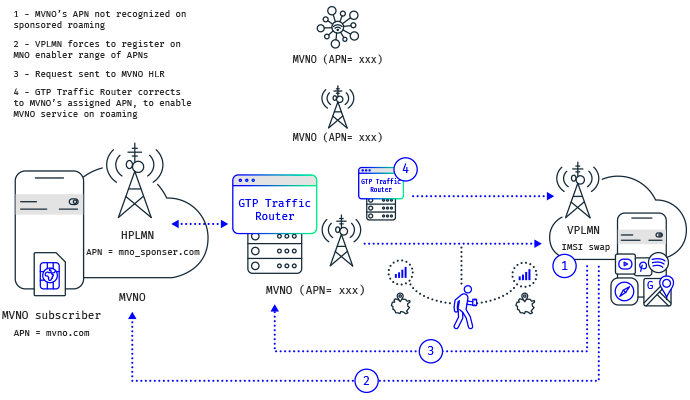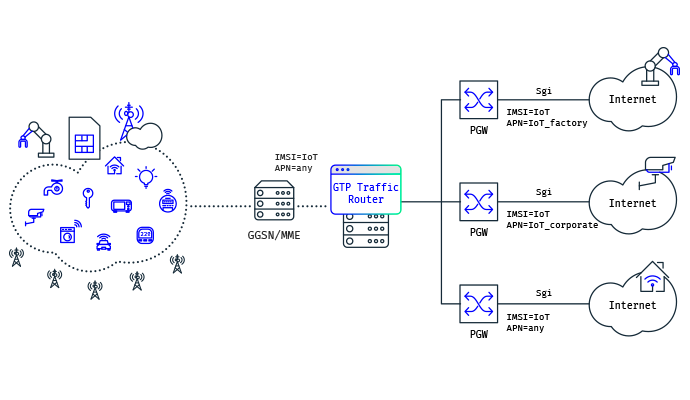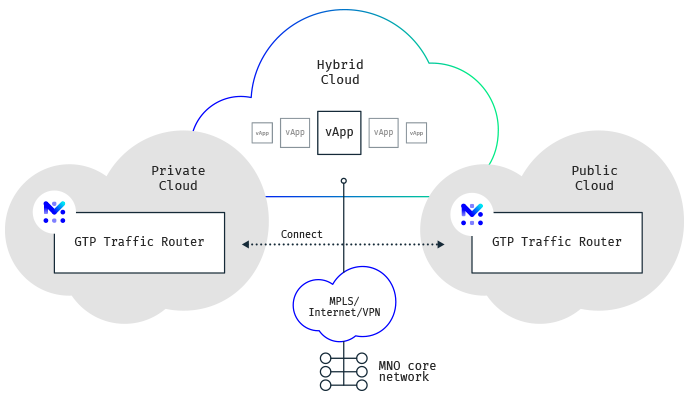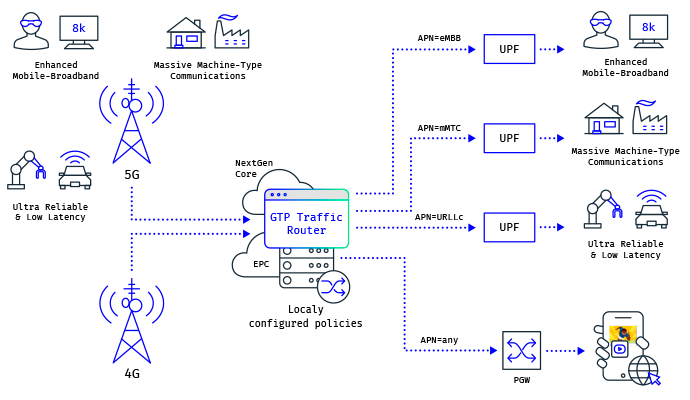
 GPRS Tunneling Protocol (GTP) is used to carry mobile data within the core of the Mobile Operator’s network. In recent years, the overall volume of the data moving through mobile networks has dramatically grown, causing several challenges to manage this type of traffic.
GPRS Tunneling Protocol (GTP) is used to carry mobile data within the core of the Mobile Operator’s network. In recent years, the overall volume of the data moving through mobile networks has dramatically grown, causing several challenges to manage this type of traffic.
GTP uses both Control Plane protocol (GTP-c) and User Plane protocol (GTP-u) to carry subscriber application traffic from the user device to the internet. To achieve an accurate and optimized redirection of the traffic on the network, it is necessary to understand several attributes and state information contained in the GTP-c, which correlate subscriber/thing to specific GTP-u traffic. Bellow some examples of how Mobileum’s GTP Traffic Router can support MNO’s:
❖ APN selection for MVNO roaming;
❖ Selection of best routing for data session;
❖ IoT APN selection;
❖ As Network Slice Function;
❖ Topology hiding.
 For all MVNOs, international roaming is a big challenge, mainly because of some probable non-existing roaming agreements. Nowadays, most user equipment has an inbuilt database for IMSI to perform APN mapping.
For all MVNOs, international roaming is a big challenge, mainly because of some probable non-existing roaming agreements. Nowadays, most user equipment has an inbuilt database for IMSI to perform APN mapping.
Nevertheless, challenges can occur in Dual IMSI scenarios of sponsored roaming. When a virtual operator uses an assigned APN, failures can occur if the MVNO’s APN is not recognized in a roaming scenario, thus redirecting the traffic back to a virtual operator enabler list of APNs. This leads to service failure delivery since the virtual operator HLR will not recognize the newly assigned APN, thus rejecting the data traffic. GTP Traffic Router can handle these scenarios automatically by reconfiguring a correct APN assigned to the MVNO. It is then transparent to the end-user that no disruption occurred during the service delivery.
 A human subscriber’s traffic widely differs from the one on mobile virtual network operators (MVNO) or a network slice dedicated to IoT. One of the key challenges in managing GTP traffic is how to effectively route and distinguish between existing GTP traffic types. Moreover, with the increase of M2M devices, the user plane data volumes and traffic patterns will add additional pressure on this traffic analysis. Offloading the GTP tracking and redirecting to a solution unaffected by traffic volume can protect the investments in traffic management capabilities.
A human subscriber’s traffic widely differs from the one on mobile virtual network operators (MVNO) or a network slice dedicated to IoT. One of the key challenges in managing GTP traffic is how to effectively route and distinguish between existing GTP traffic types. Moreover, with the increase of M2M devices, the user plane data volumes and traffic patterns will add additional pressure on this traffic analysis. Offloading the GTP tracking and redirecting to a solution unaffected by traffic volume can protect the investments in traffic management capabilities.
Planning a course for GTP traffic is usually based on the content of GTP messages (GTP Information Elements) and also – but not limited to – other aspects like source and destination. A smart GTP routing function like ours can select the right Packet Gateway (PGW) or network slice that best suits a specific service. Mobileum's GTP Traffic Router was developed to control advanced routing, proxy, and security functionalities while being able to access GTP information when routing MVNO and a service provider’s traffic to different destinations using the same APN.
 There are multiple scenarios where APNs get corrupted, leading to data outages for end-users. GTP Traffic Router provides a seamless solution to proactively handle APN corruption issues and ensure service continuity, which reduces customer complaints and safeguards revenue. Several other use cases are enabled by GTP Traffic Router, like topology-hiding, local break out, load balancing, GTP information element (IE) modification, among others.
There are multiple scenarios where APNs get corrupted, leading to data outages for end-users. GTP Traffic Router provides a seamless solution to proactively handle APN corruption issues and ensure service continuity, which reduces customer complaints and safeguards revenue. Several other use cases are enabled by GTP Traffic Router, like topology-hiding, local break out, load balancing, GTP information element (IE) modification, among others.
The GTP Traffic Router checks the IMSI and APN data in the GTP layer and depending on the IMSI and APN data can perform APN correction and orchestrate GTP parameters to ensure that the PDP context is correctly established between the SGSN and the GGSN. This solution allows appropriate routing of messages, in particular for ones to and from the end-user device, which is a critical asset for IoT ecosystem with moving sensors and critical applications.
 Network slicing is the operators’ best solution to build and manage a network that meets and tops the emerging requirements from a wide range of partners. Usually seen as 5G capability, MNOs do not need to wait for the latest network technology to monetize and optimize differentiated mobile services.
Network slicing is the operators’ best solution to build and manage a network that meets and tops the emerging requirements from a wide range of partners. Usually seen as 5G capability, MNOs do not need to wait for the latest network technology to monetize and optimize differentiated mobile services.
With 4G networks being widely deployed, Mobileum GTP Traffic Router brings the ability to create a “network slicing” on 4G networks, simplifying operations and the capacity to get a selection of gateways across multiple dedicated virtual core network instances. GTP Traffic Router creates a virtual slice instance on 4G core using Access Point Names (APNs) and virtualized Evolved Packet Core (vEPC) to serve different user groups in 4G networks performing traffic separation. APN routing maps the traffic to a specific class of service.

 A method of supporting roaming in wireless communication networks comprises:
A method of supporting roaming in wireless communication networks comprises:
❖ obtaining an access point name (APN) and a preferred roaming protocol for user equipment (UE) roaming from a home network to a visited network;
❖ determining a network entity to provide data connectivity for the UE based on the APN;
❖ and the preferred roaming protocol.
Mobileum’s GTP Traffic Router works like a proxy for GTP-C and GTP-U traffic, which enables the operator to define flexible routing and traffic segregation decision, based on subscriber category, roaming location, APN, etc. GTP Traffic Router inspects GTP packets looking for APNs that match APNs that you set. If the APN of a GTP packet matches an APN that you specified, the routing engine device verifies the selection criteria and only forwards the GTP packet if both the APN and the selection criteria match the APN according to the specified criteria.
 Most application architectures rely on “all” GTP signaling and “all” GTP user plane being examined together in the same analysis engine. This “all traffic to the same engine” requirement brings a vital problem in scaling the performance of such analysis engines. The scaling obstacles of this architecture, processing “all” signaling and “all” user plane together, can be mitigated by the use of Mobileum’s GTP Traffic Router' distribution filters, which allow to allocate traffic via various criteria, such as IMSI, IMEI or randomly generate per-session keys, etc.
Most application architectures rely on “all” GTP signaling and “all” GTP user plane being examined together in the same analysis engine. This “all traffic to the same engine” requirement brings a vital problem in scaling the performance of such analysis engines. The scaling obstacles of this architecture, processing “all” signaling and “all” user plane together, can be mitigated by the use of Mobileum’s GTP Traffic Router' distribution filters, which allow to allocate traffic via various criteria, such as IMSI, IMEI or randomly generate per-session keys, etc.
Key features:
❖ Distribution of GTP-C and GTP-U based on session;
❖ Distribution channel derived from IMSI;
❖ Flexible and weighted distribution;
❖ Rich set of filtering features;
❖ Fragment handling in distribution.
Key applications:
❖ Monitoring/analyzing/managing data traffic in mobile networks;
❖ Dynamic monitoring of specific GTP sessions/users;
❖ Flexible and weighted distribution;
❖ Session-based analysis;
❖ VIP and lawful intercept of users/IMSIs.
 GTP Traffic Router solution is deployed in active mode enabling the operator to control and modify session parameters on the call flow. These controls and modifications can be dynamic by design, like bar sessions in a particular VPMN network. Some examples of GTP Traffic Router possible deployments can be described as:
GTP Traffic Router solution is deployed in active mode enabling the operator to control and modify session parameters on the call flow. These controls and modifications can be dynamic by design, like bar sessions in a particular VPMN network. Some examples of GTP Traffic Router possible deployments can be described as:
❖ Enablement of Simplified charging in HPMN ;
❖ IMSI Modification ;
❖ Creation of Local Profile.

Mobileum's GTP Traffic Router can be deployed in public or private cloud environments. The use of a private cloud is now a common use for telco's network services. However, the use of a public environment can bring to telcos lower operational costs than those associated with traditional networks, and also the ability to bring services to market much quicker than before. Mobileum's GTP Traffic Router implementation can be part of the MNO's process to implement its SDN or, if needed, can be used in NaaS strategy.
 In the IoT ecosystem, IoT devices' battery life is key since many of them are simply sensors that in theory can be used for years sending just a minor amount of information periodically.
In the IoT ecosystem, IoT devices' battery life is key since many of them are simply sensors that in theory can be used for years sending just a minor amount of information periodically.
With Mobileum’s GTP Traffic Router solution, we introduce an effective way to communicate with local IoT gateways and cloudlets. Our solution can generate impact by managing the priority of local messaging and providing faster responses, which means devices are able to open communication channels for shorter periods, due to improved latency. As an outcome the GTP Traffic Router solution, enables the battery life of IoT devices to be extended, when compared to full-path, end-to-end communication where no such solution has been deployed.

One of the key functionalities delivered by GTP Traffic Router is to provide the ability to apply policy enforcement to MVNO’s end-subscribers by managing configured APNs. However, there is a high need to understand if the existing APNs are configured as expected.
To guarantee these configurations, Mobileum delivers a wide range of testing solutions that cross all spectrum from IoT to Voice and Data, with the ability to validate the existing APNs. This way it is possible to ensure that the APNs managed by GTP Traffic Router, are used as they should and are performing according to the expectations.

The 5G architecture brings some new concepts and one of the major news is the ability to “slice” the network into different “communication channels”. Mobileum’s GTP Traffic Router can deliver mobile core network slicing capabilities based on locally configured policies for 5G as it does on 4G solution. The solution gives service providers better control over how subscriber sessions are distributed over mobile core elements, an extremely important feature to manage IoT and MVNO business solutions.